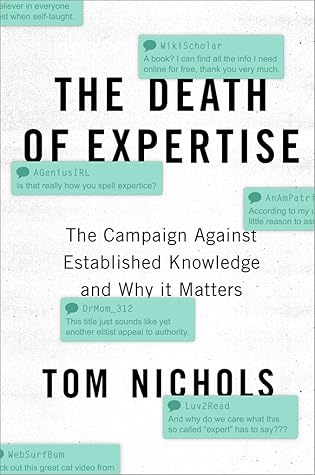More on this book
Community
Kindle Notes & Highlights
Read between
April 7 - April 29, 2018
The relationship between experts and citizens, like almost all relationships in a democracy, is built on trust. When that trust collapses, experts and laypeople become warring factions.
As the writer Susan Jacoby put it in 2008, the most disturbing aspect of the American march toward ignorance is “not lack of knowledge per se but arrogance about that lack of knowledge.”
Awash in gadgets and conveniences that were once unimaginable even within their own lifetimes, Americans (and many other Westerners, if we are to be fair about it) have become almost childlike in their refusal to learn enough to govern themselves or to guide the policies that affect their lives. This is a collapse of
functional citizenship, and it enables a cascade of other baleful consequences.
Thomas challenged readers to “contrast the mistakes of the 1960s to times when Washington allowed foreign policy to be set by public consensus.” In the 1930s, Congress closed off free trade to protect American industry and listened to voters who wanted a smaller, less costly military with no entangling alliances. The results? The Smoot-Hawley tariff contributed to the Great Depression, and the failure of the League of Nations allowed the rise of fascism and global war.
This illustrates an important point: then as now, Americans tend to think about issues like macroeconomic policy or foreign affairs only when things go wrong.
To ignore expert advice is simply not a realistic option, not only due to the complexity of policymaking, but because to do so is to absolve citizens of their responsibilities to learn about issues that matter
directly to their own well-being.
This is the worst of all worlds, in which both democracy and expertise are corrupted because neither democratic leaders nor their expert advisers want to tangle with an ignorant electorate. At that point, expertise no longer serves the public interest, but the interest of whatever political clique is taking the temperature of the public at any given moment. We are already perilously close to this outcome in modern America.
This is crucial because laypeople too easily forget that the republican form of government under which they live was not designed for mass decisions about complicated issues. Neither, of course, was it designed for rule by a tiny group of technocrats or experts. Rather, it was meant to be the vehicle by which an informed electorate—informed being the key word here—could choose other people to represent them and to
democracy to mean a condition of political equality, in which one person gets one vote, and every individual is no more and no less equal in the eyes of the law. Rather, Americans now think of democracy as a state of actual equality, in which every opinion is as good as any other on almost any subject under the sun.
graduates, and he then promises that by use of the word “purely as an incantation,” human beings can be fooled not only into believing an obvious lie, but led to nurture that lie as a cherished feeling: The feeling I mean is of course that which prompts
man to say I’m as good as you.
Revolt of the Masses in 1930: “The mass crushes beneath it everything that is different, everything that is excellent, individual, qualified and select.
And so it is. When resentful laypeople demand that all marks of achievement, including expertise, be leveled and equalized in the name of “democracy” and “fairness,” there is no hope for either democracy or fairness. Everything becomes a matter of opinion,
Democracy, as practiced in the United States in the early twenty-first century, has become a resentful, angry business.
Experts are derided as elitists, one of many groups putatively oppressing “we the people,” a term now used by voters indiscriminately and mostly to mean “me.”
frustration, but of their anger and sadness over ruptured relationships with patients, clients, and students, and even the cooling of close personal friendships, all because they are finally demanding an end to ill-informed lectures about their own area of competence.
such temptations have suffered any number of terrible fates, including mass repression, cultural and material poverty, and defeat in war. I still have
Democracy, as Lewis’s Screwtape knew, denotes a system of government, not an actual state of equality.


